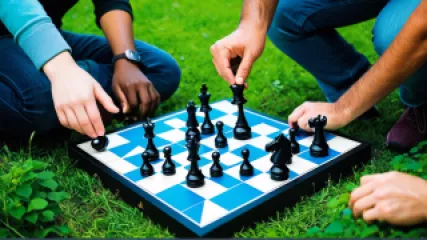Enhancing Cognitive Flexibility for Personal Growth
Cognitive flexibility is a mental skill that allows individuals to adapt their thinking and behavior in response to changing circumstances. It involves the ability to switch between different tasks, perspectives, or strategies, as well as the capacity to generate new ideas and solutions. Enhancing cognitive flexibility can have numerous benefits for personal growth, including improved problem-solving abilities, increased creativity, and enhanced resilience in the face of challenges. In this tutorial, we will explore various techniques and strategies that can help you enhance your cognitive flexibility for personal growth.
Understanding Cognitive Flexibility
Cognitive flexibility is closely related to executive functions, which are a set of cognitive processes that help individuals regulate their thoughts, actions, and emotions. It is an essential component of cognitive control and plays a crucial role in adaptive behavior.
Individuals with high cognitive flexibility can easily switch between different mental sets, adapt their thinking to new contexts, and effectively manage conflicting information. They are open to new experiences, can see multiple perspectives, and are more willing to consider alternative solutions.
The Benefits of Cognitive Flexibility
Improving cognitive flexibility can have several positive effects on personal growth and overall well-being. Here are some of the key benefits:
- Enhanced problem-solving: Cognitive flexibility allows individuals to approach problems from different angles, consider a variety of solutions, and think outside the box. This can lead to more effective problem-solving abilities and improved decision-making skills.
- Increased creativity: When individuals can easily shift between different modes of thinking, they are more likely to generate innovative ideas and come up with creative solutions to challenges. Cognitive flexibility enables individuals to connect seemingly unrelated concepts and think in unconventional ways.
- Better emotional regulation: Cognitive flexibility enables individuals to adapt their emotional responses to different situations. It helps in regulating emotions, managing stress, and bouncing back from setbacks more effectively.
- Improved learning: Cognitive flexibility allows individuals to approach new information with an open mind and integrate it into existing knowledge structures. This can lead to improved learning outcomes and a deeper understanding of complex concepts.
- Enhanced adaptability: In a rapidly changing world, being able to adapt quickly and effectively is crucial. Cognitive flexibility helps individuals adjust their strategies, behaviors, and goals to meet new challenges and seize opportunities.
Techniques to Enhance Cognitive Flexibility
Now that we understand the importance of cognitive flexibility, let's explore some techniques and strategies that can help enhance this valuable skill:
1. Embrace Novel Experiences
Engaging in new experiences can stimulate neural connections and promote cognitive flexibility. Seek out opportunities to try new activities, visit unfamiliar places, or learn about different cultures. By exposing yourself to novel situations, you can expand your perspective and develop a more flexible mindset.
2. Practice Mindfulness
Mindfulness meditation is a powerful tool for improving cognitive flexibility. Regular mindfulness practice helps cultivate non-judgmental awareness of the present moment, allowing you to observe your thoughts and emotions without getting entangled in them. This heightened self-awareness can reduce cognitive rigidity and enhance your ability to adapt to changing circumstances.
3. Engage in Divergent Thinking
Divergent thinking involves generating multiple solutions or ideas to a given problem. Engage in activities that encourage divergent thinking, such as brainstorming sessions, creative writing, or artistic endeavors. By challenging yourself to think beyond conventional boundaries, you can foster cognitive flexibility and expand your problem-solving repertoire.
4. Foster Cognitive Dissonance
Cognitive dissonance occurs when individuals experience conflicting thoughts, beliefs, or attitudes. While it may be uncomfortable, embracing cognitive dissonance can promote cognitive flexibility by encouraging individuals to consider alternative viewpoints and seek resolution. Engage in discussions, read diverse opinions, and expose yourself to different perspectives to challenge your existing beliefs and foster cognitive growth.
5. Practice Cognitive Restructuring
Cognitive restructuring involves identifying and challenging cognitive distortions or rigid thinking patterns. When faced with negative thoughts or limiting beliefs, consciously challenge them and replace them with more flexible and adaptive alternatives. This practice helps break the cycle of automatic negative thinking and promotes cognitive flexibility.
6. Play Brain-Teasing Games
Engaging in puzzles, riddles, and strategic games can sharpen cognitive skills, including cognitive flexibility. Games like chess, Sudoku, or crosswords require individuals to think flexibly, consider multiple possibilities, and adjust their strategies accordingly. Regularly incorporating brain-teasing games into your routine can improve cognitive flexibility over time.
Conclusion
Cognitive flexibility is a valuable skill that can greatly contribute to personal growth and development. By actively enhancing your cognitive flexibility, you can improve problem-solving abilities, increase creativity, and adapt more effectively to changing circumstances. Embrace novel experiences, practice mindfulness, engage in divergent thinking, foster cognitive dissonance, practice cognitive restructuring, and incorporate brain-teasing games into your routine. By doing so, you can unlock the full potential of your cognitive flexibility and embark on a journey of personal growth.






